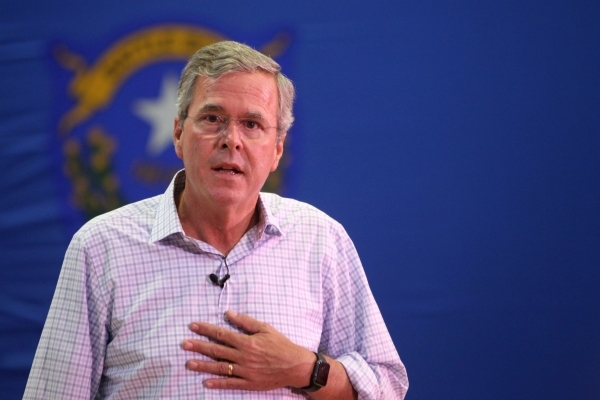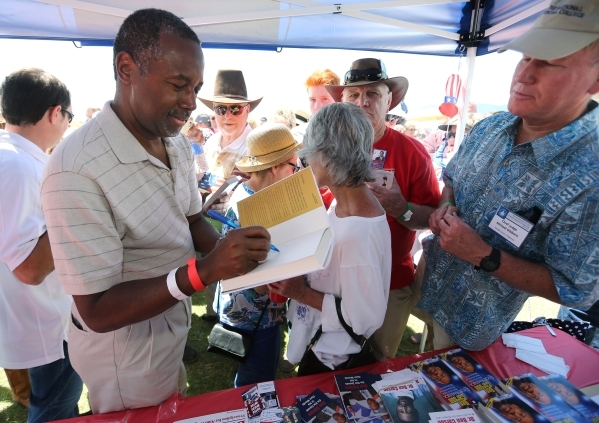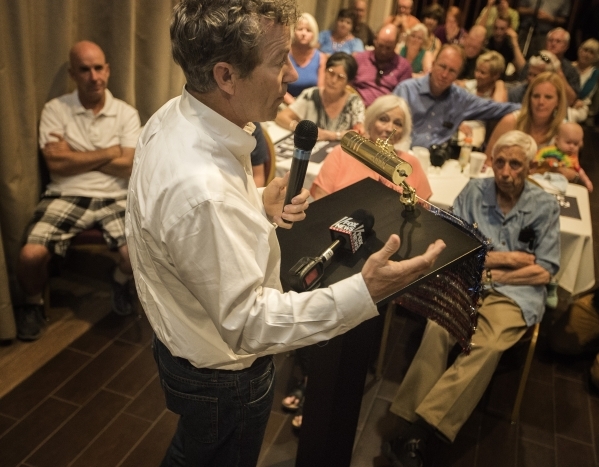Candidates reveal different styles in Las Vegas campaign stops
A circus has been coming to Las Vegas nearly every week this summer, but not the kind with clowns and dancing elephants that delights youngsters.
Instead, the ringmasters are candidates running for president and their shows are filled with political acrobatics.
Some candidates go about their campaigning with the discipline and precision of a ringmaster aiming for The Greatest Show on Earth, offering carefully choreographed events that leave little room for gaffes.
Other candidates appear less worried about pesky reporters and mingle unguarded with the voting public. One didn't even mind stumping on a road median amid closely passing traffic.
The seemingly never-ending parade of candidates is to be expected here. Nevada is an early voting state with February caucuses that play a key role in determining which candidates get the Democratic and Republican nominations. Its importance is on par with New Hampshire, South Carolina and Iowa, other states with early primaries or caucuses.
"There are politicians that are very spontaneous but they're rare," said Fred Lokken, a political science professor at Truckee Meadows Community College in Reno. "Most of them in this day and age need a script."
For voters, the varying styles might provide clues about a candidate's potential deftness as president in handling crises on the fly, and their skills at facing opposing viewpoints. But instead of national disasters, it's on a less dramatic scale: "Black Lives Matter" protesters making some noise at Republican presidential candidate Jeb Bush's town hall in North Las Vegas, for example.
The campaign of Democratic front-runner Hillary Clinton, who has a famously rocky relationship with the press, roped off reporters from the audience at the community center in North Las Vegas where she had a town hall on Aug. 18. But she did talk to reporters afterward, taking questions about her use of a private email server, and turning an otherwise staid town hall into a big news story.
At the same community center, it was an entirely different arrangement when former Florida Gov. Jeb Bush stumped there the week before Clinton's event. No ropes kept the media corralled, and a Review-Journal reporter sat in the audience with a pen and notebook in hand.
Some candidates have even given one-on-one interviews to reporters at events: Republicans Ben Carson, a retired neurosurgeon, and U.S. Sen. Rand Paul of Kentucky among them.
All candidates hoping to land in the White House want to be seen as being of the people. The subtle differences among the candidates' approach point to a number of factors: varying personalities, an eagerness for media coverage for those who need the exposure, and, conversely, a desire to avoid gaffes if they are high in the polls.
Changing times
Once upon a time, campaign events were much livelier and unpredictable — both for the audience and the candidate. Candidates traveled by train to campaign stops along rail lines, propped up higher than the audience and intent on getting their message out. Protesters were known to pelt them with mud and vegetables.
"Politicians were more animated and more fiery," Lokken said. "They brought more emotion to the stump than we see now."
Campaign events began to change in the 1960s with the advent of television. Candidates became more concerned about the optics and timing of their events and quickly realized that their words spread much farther. Now, it's easier to compare candidate statements across the nation and check for contradictions. That wasn't true a century ago.
"Nobody was really paying attention on a day-to-day basis. They weren't being hounded every day," said Eric Herzik, political scientist at the University of Nevada, Reno. "There was no treasure trove of past comments that could be Googled. You have to be more careful now."
Taking risks
Still, untraditional campaign events and taking risks aren't entirely extinct.
For example, Bunkerville rancher Cliven Bundy met privately with Paul when the Kentucky senator stopped in Mesquite this summer for a town hall. Democrats seized on the meeting, criticizing Paul's lack of good judgment.
Bundy is under federal investigation after an armed standoff in April 2014 involving him, his supporters and federal agents who were rounding up Bundy's cows because he failed to pay grazing fees for using public lands.
On Aug. 19, Democratic candidate Martin O'Malley, a former Maryland governor, stood atop a traffic median in front of Trump International. He criticized GOP front-runner Donald Trump, who owns the Las Vegas hotel, and supported Culinary Local 226, which wants to organize there. Cars whizzed by and Las Vegas police monitored the gathering of O'Malley, reporters, workers and union officials.
In essence, it's a two-part formula. One part is what the candidate is comfortable with and the other part has to do with where they are in the polls. O'Malley is in the bottom rungs of polls.
"If you're the front-runner, you're more guarded," Herzik said. "If you're behind, in particular if you're way behind, you do events that tend to attract attention — like O'Malley."
It's also easier for the public to meet lesser-known candidates in private meetings. But that lends itself to potential fallout.
A notable exception is Trump, who thrives on frankly answering questions in an unscripted way that often draws controversy. But Trump's run is unconventional and the billionaire businessman has said voters are attracted to his style of telling it how it is.
In contrast to Clinton's campaign, reporters sat in chairs in the front row of an event at a Las Vegas restaurant with former Arkansas Gov. Mike Huckabee, a Republican candidate. Huckabee joked with the audience and contrasted his difference with the Democratic front-runner — pointing to the reporters sitting several feet away to show he doesn't rope off the press.
Democrats polling below Clinton are easier to approach, too. When U.S. Sen. Bernie Sanders, I-Vt., held a rally in Las Vegas, unescorted reporters followed him across the stage to a back room, where he answered questions.
But Clinton has one thing that Sanders doesn't: Secret Service protection. After all, she's a former first lady.
James DeHaven contributed to this report. Contact Ben Botkin at bbotkin@reviewjournal.com or 702-387-2904. Find him on Twitter: @BenBotkin1

















